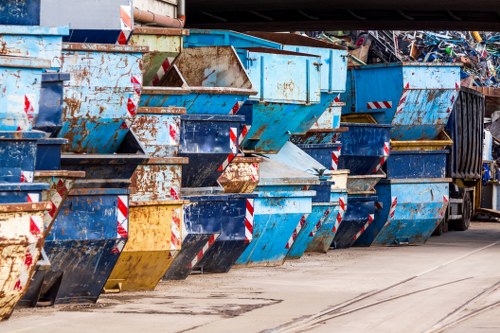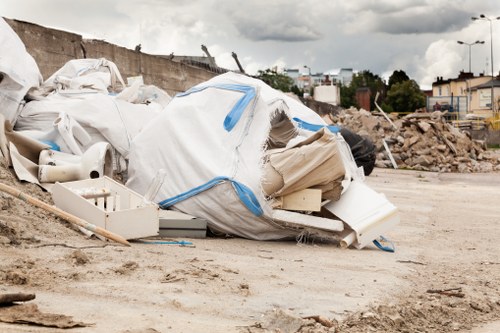Rubbish Clearance Canary Wharf: Keeping the Heart of London Clean

Canary Wharf is one of London's busiest financial districts, attracting thousands of professionals and visitors each day. With this influx comes the inevitable challenge of managing waste effectively. Rubbish clearance in Canary Wharf is essential to maintain the area's cleanliness, sustainability, and overall appeal.
Proper waste management not only ensures a pleasant environment but also supports the local economy by providing jobs and promoting recycling initiatives. In this article, we will explore the importance of rubbish clearance in Canary Wharf, the services available, and tips for effective waste management.
Understanding the types of waste generated in Canary Wharf is the first step towards efficient rubbish clearance. From office waste to construction debris, each category requires different handling methods to ensure proper disposal and recycling.
Why Rubbish Clearance Matters in Canary Wharf

Canary Wharf's reputation as a premier business hub means that maintaining its image is crucial. Accumulated rubbish can tarnish this image, making cleanliness a top priority for both businesses and residents.
Effective rubbish clearance contributes to public health by reducing the risk of pests and limiting the spread of diseases. Additionally, it helps in minimizing environmental impact by promoting recycling and reducing landfill waste.
Moreover, proper waste management can lead to significant cost savings for businesses by implementing efficient recycling programs and reducing the volume of waste sent to landfills.
Types of Rubbish in Canary Wharf

- Office Waste: Paper, plastics, electronics, and general office trash.
- Construction Debris: Materials from building projects, including concrete, bricks, and metals.
- Recyclable Materials: Glass, aluminum, cardboard, and other items that can be processed for reuse.
- Hazardous Waste: Chemicals, batteries, and other items that require special handling.
Each type of waste requires specific disposal methods to ensure compliance with local regulations and environmental standards.
Understanding these categories helps in selecting the right rubbish clearance services tailored to specific needs.
Rubbish Clearance Services in Canary Wharf

There are numerous rubbish clearance services available in Canary Wharf, each offering a range of solutions to meet different requirements.
- Same-Day Collection: Ideal for urgent waste removal needs.
- Scheduled Services: Regular pickups to ensure ongoing cleanliness.
- Recycling Programs: Specialized services focused on recycling and sustainable waste management.
- Commercial Clearance: Tailored services for businesses, including large-scale waste removal.
Choosing the right service depends on the volume and type of waste, as well as the specific needs of the business or resident.
Many companies also offer additional services such as hazardous waste disposal and on-site waste sorting to further enhance their rubbish clearance offerings.
Benefits of Professional Rubbish Clearance

Hiring a professional rubbish clearance service in Canary Wharf comes with numerous benefits:
- Efficiency: Professionals have the expertise and equipment to handle waste quickly and effectively.
- Compliance: Ensures that waste is disposed of in accordance with local regulations.
- Safety: Reduces the risk of accidents and exposure to hazardous materials.
- Environmental Impact: Promotes recycling and reduces the carbon footprint.
These advantages make professional rubbish clearance a worthwhile investment for maintaining a clean and sustainable environment.
Additionally, professional services often provide detailed reporting and tracking, allowing businesses to monitor their waste management practices and identify areas for improvement.
Tips for Effective Rubbish Clearance

- Sort Your Waste: Separate recyclable materials from general waste to streamline the clearance process.
- Schedule Regular Pickups: Regularly scheduled rubbish clearance prevents accumulation and keeps the area tidy.
- Reduce, Reuse, Recycle: Implement practices that minimize waste production and maximize recycling.
- Educate Staff: Ensure that everyone in the organization understands the importance of proper waste management.
- Partner with Reliable Services: Choose reputable rubbish clearance providers who prioritize sustainability and compliance.
Implementing these strategies can significantly enhance the effectiveness of rubbish clearance efforts in Canary Wharf.
Moreover, fostering a culture of responsibility and sustainability within the workplace ensures long-term benefits for both the environment and the business.
Recycling Initiatives in Canary Wharf

Recycling plays a crucial role in rubbish clearance by reducing the amount of waste sent to landfills and conserving natural resources.
- Paper Recycling: Offices can reduce paper waste by digitalizing documents and implementing double-sided printing.
- Plastic Recycling: Encourage the use of reusable containers and proper sorting of plastic waste.
- Electronic Waste: Dispose of electronics responsibly by partnering with certified e-waste recyclers.
- Metal Recycling: Collect and recycle metals from construction projects and office waste.
By prioritizing recycling, Canary Wharf can enhance its sustainability efforts and contribute to a greener environment.
Additionally, engaging in community recycling programs fosters a sense of collective responsibility and encourages wider participation in waste management initiatives.
Local Relevance: Nearby Areas to Canary Wharf

Canary Wharf is surrounded by several key areas, each contributing uniquely to the region's rubbish clearance needs.
- Wapping: Located just east of Canary Wharf, Wapping offers easy access for waste collection vehicles and benefits from the area's industrial waste management services.
- Greenwich: South of Canary Wharf, Greenwich's residential and commercial zones rely on efficient rubbish clearance to maintain their historical charm.
- Isle of Dogs: Surrounding Canary Wharf, the Isle of Dogs has a mix of residential and business properties that require regular waste management support.
- Stratford: West of Canary Wharf, Stratford's growing businesses benefit from the extensive rubbish clearance services available in the area.
- Poplar: Adjacent to Canary Wharf, Poplar's community centers and offices depend on reliable waste removal services.
- Lewisham: Southeast of Canary Wharf, Lewisham's diverse neighborhoods utilize comprehensive rubbish clearance solutions.
- Shadwell: Close to Canary Wharf, Shadwell's commercial activities require efficient waste management to support local businesses.
- Stratford: North of Canary Wharf, Stratford's commercial hubs benefit from the nearby rubbish clearance infrastructure.
- Mile End: Northeast of Canary Wharf, Mile End's educational institutions and businesses require dedicated waste management services.
- Bank: Northwest of Canary Wharf, Bank's financial institutions rely on efficient rubbish clearance to maintain their operations.
Each of these areas supports Canary Wharf's waste management ecosystem, ensuring comprehensive coverage and efficient rubbish clearance throughout the region.
Collaborative efforts between these neighborhoods and rubbish clearance services enhance overall cleanliness and sustainability.
Challenges in Rubbish Clearance

Despite the availability of rubbish clearance services, several challenges can impede effective waste management in Canary Wharf:
- High Waste Volume: The density of businesses and residents generates significant amounts of waste daily.
- Recycling Compliance: Ensuring all entities adhere to recycling regulations can be difficult.
- Space Constraints: Limited space for waste storage and processing can hinder clearance efforts.
- Environmental Concerns: Minimizing the environmental impact of waste disposal remains a priority.
Addressing these challenges requires coordinated efforts between businesses, residents, and rubbish clearance providers.
Investing in advanced waste management technologies and promoting sustainable practices can help overcome these obstacles.
Future of Rubbish Clearance in Canary Wharf

The future of rubbish clearance in Canary Wharf is poised to embrace innovation and sustainability. Advancements in waste management technologies, such as automated sorting systems and smart waste bins, will enhance efficiency and accuracy in waste processing.
- Smart Waste Management: Utilizing IoT devices to monitor waste levels and optimize collection routes.
- Enhanced Recycling Techniques: Developing new methods for recycling complex materials.
- Green Initiatives: Increasing focus on reducing single-use plastics and promoting biodegradable materials.
- Community Engagement: Encouraging local participation in sustainability programs.
These developments will not only improve rubbish clearance services but also contribute to a more sustainable and environmentally friendly Canary Wharf.
Collaborative efforts between technology providers, waste management companies, and the community will drive forward these initiatives, ensuring a clean and vibrant future for the area.
Conclusion

Rubbish clearance in Canary Wharf is a critical component of maintaining the area's status as a leading business hub. By prioritizing efficient waste management practices, recycling initiatives, and embracing future technologies, Canary Wharf can continue to thrive while preserving its environment.
Businesses and residents alike play a vital role in ensuring that rubbish clearance services operate smoothly and sustainably. Through collective effort and ongoing commitment, Canary Wharf will remain a clean, attractive, and sustainable destination for years to come.
Frequently Asked Questions
1. How often should rubbish clearance be scheduled in Canary Wharf?
Rubbish clearance frequency depends on the volume and type of waste. For high-traffic areas with significant waste production, daily or multiple weekly pickups may be necessary. Businesses can work with service providers to determine the optimal schedule based on their specific needs.
2. What types of waste can be recycled in Canary Wharf?
Common recyclable materials in Canary Wharf include paper, cardboard, plastics, glass, metals, and certain electronic waste. It's important to sort these materials properly to ensure they are processed correctly by recycling facilities.
3. Are there any restrictions on hazardous waste disposal in Canary Wharf?
Yes, hazardous waste such as chemicals, batteries, and electronic components must be disposed of through specialized services that comply with local regulations. It's essential to contact professional rubbish clearance providers for safe and compliant disposal of hazardous materials.
4. How can businesses reduce their waste output in Canary Wharf?
Businesses can implement strategies such as reducing paper usage, opting for reusable containers, recycling regularly, and encouraging employees to minimize waste. Additionally, partnering with eco-friendly rubbish clearance services can further aid in waste reduction efforts.
5. What are the environmental benefits of proper rubbish clearance in Canary Wharf?
Proper rubbish clearance helps reduce landfill waste, lowers greenhouse gas emissions, conserves natural resources through recycling, and minimizes pollution. These efforts contribute to a healthier environment and promote sustainability within the community.